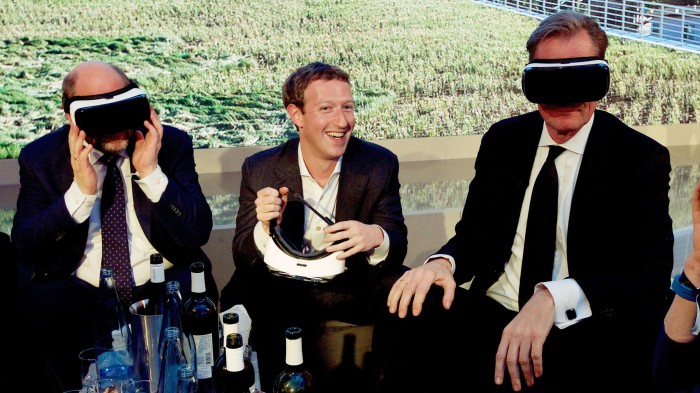Mark Zuckerberg Says It Will Take 10 Years for Virtual Reality to Reach Mass Market
Facebook founder and CEO Mark Zuckerberg has been stoking excitement about virtual reality—a technology he has described as “the next major computing and communication platform”—for a few years now. But in a new interview posted at Business Insider, he says the technology remains a long way from reaching the mass market.
“I honestly don’t know how long it will take,” he said. “It could be five years, it could be 10 years, it could be 15 or 20. My guess is that it will be at least 10.”
More than a decade is a long time in the technology industry. And Zuckerberg’s sober assessment stands in stark contrast to recent enthusiasm for virtual reality that he is in no small part responsible for.
Facebook acquired the virtual-reality headset company Oculus VR for $2 billion in 2014, an event that helped unlock a torrent of millions of dollars of investment into other virtual-reality startups and the growth of competing projects at large companies such as Google and Microsoft.

Virtual-reality technology has certainly advanced a lot in recent years. Dedicated headsets such as Oculus’s Rift have been used to create impressive games, movies, and other experiences. And Oculus and Google have both made it possible to experience virtual reality using a smartphone.
But even using the best hardware and software available can still leave you disoriented and nauseated. It is not clear which types of virtual-reality content will appeal to a wide audience or whether many people are willing to spend money on the hardware for it.
If Zuckerberg is correct, some recent investments in virtual reality could turn out to be bad ones.
Facebook’s founder and other industry figures have often said that virtual reality will be similar in impact to the advent of the smartphone, becoming a staple of everyday life that unlocks brand-new markets for media and technology companies to profit from.
That’s a tempting prospect for startups, large companies, and tech investors at a time when the smartphone boom that has driven growth in recent years is starting to slow. But many of today’s virtual-reality startups, investments, and projects may not be able to last the 10 years or more that Zuckerberg predicts it will take for the technology to reach a large number of consumers.
(Read more: Business Insider, “What Zuckerberg Sees in Oculus Rift,” “A Film Studio for the age of Virtual Reality”, “Inside the first VR Theme Park”)
Keep Reading
Most Popular
Large language models can do jaw-dropping things. But nobody knows exactly why.
And that's a problem. Figuring it out is one of the biggest scientific puzzles of our time and a crucial step towards controlling more powerful future models.
The problem with plug-in hybrids? Their drivers.
Plug-in hybrids are often sold as a transition to EVs, but new data from Europe shows we’re still underestimating the emissions they produce.
Google DeepMind’s new generative model makes Super Mario–like games from scratch
Genie learns how to control games by watching hours and hours of video. It could help train next-gen robots too.
How scientists traced a mysterious covid case back to six toilets
When wastewater surveillance turns into a hunt for a single infected individual, the ethics get tricky.
Stay connected
Get the latest updates from
MIT Technology Review
Discover special offers, top stories, upcoming events, and more.